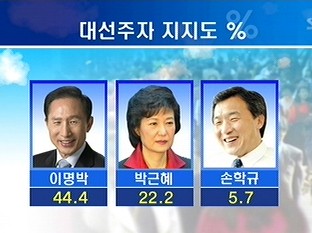Press Release
A wide ranging survey of voter attitudes has found that Korean women are increasingly independent in their choices, people in their 30s may be abandoning liberalism and a new kind of regionalism is pitting the capital area against the rest of the country.
The survey, conducted by the JoongAng Ilbo, East Asia Institute, Hankook Research and Seoul Broadcasting System, sampled the views of 3,500 people in a telephone survey conducted from April 25 to 28. The survey has a margin of error of plus or minus 1.7 percent and a 95 percent confidence level.
The group plans to conduct five more surveys before the presidential election.
"Korean women may no longer fit traditional voting patterns," said Kim Min-jun, a political science professor at KyungHee University, after analyzing the data.
"In the past, women tended to vote in line with their spouses' political preferences," Kim said, but they are shifting their support to Park Geun-hye, the female candidate of the Grand National Party.
While 22.2 percent of the general public back Park, her support among women stands at 25.2 percent, according to the survey. Only 19.2 percent of men in the survey backed Park, the daughter of assassinated President Park Chung-hee.
Former Seoul mayor Lee Myung-bak has the support of 45.2 percent of men in the survey but only 43.6 percent of women were in favor of the former Seoul mayor.
In a close race the gender difference could become significant.
Another change noted is in the pattern of regionalism. Previous presidential elections reflected a divide along the lines of east and west, with differences between the Gyeongsang provinces and Jeolla and Chungcheong provinces.
"This time, the election may reflect a divide between the Seoul metropolitan area and the rest of the country," Kim Jang-su, a political science professor at Korea University, said after interpreting the poll data.
Lee Myung-bak enjoyed 50.7 percent support in the capital area, well above his national average of 44.4 percent. In Seoul, which has always been hotly contested, his support rises to 53.3 percent, three times higher than Park.
Lee’s support outside of the metropolitan area hovered above his national average in only two places, Daegu and North Gyeongsang province.
Meanwhile, Park notched 30.1 percent support outside the capital region, surpassing her national average of 22.2 percent.
The survey also showed that the east versus west divide has eased. Even the Jeolla provinces, which usually back the liberal parties, are giving Lee 30 percent support.
In the Chungcheong area, the support for Lee and Park, the two leading candidates, is above 60 percent, defying a so-called "western belt" strategy by the liberal parties that may include the Jeolla, Chungcheong and the Gyeonggi areas.
Meanwhile, "voters in their 30s who have traditionally supported the liberals are changing their tune," said Lim Sung-hak, a professor at the University of Seoul. Lee Myung-bak received a 44.9 percent support while 20.1 percent said they support Park Geun-hye, Lim noted. "This marks a conservative swing by this age group," he said.
Age could still be a factor. Thirty-four percent of people in their 20s said they lean toward the liberals, with 55.1 percent saying they planned to vote this time. Lee enjoys 46.6 percent support from voters in their 20s and 30s, which could limit the age factor.
[Figure] Public Support for Big 3 Candidates for the Presidential Election

Lee Park Sohn
By Shin Chang-un, Brian Lee